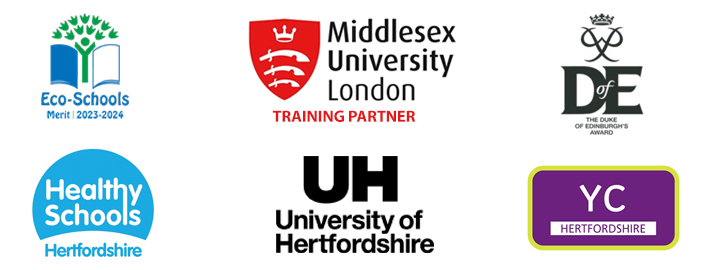Psychology
Our main aim in Psychology is to enable students to think independently, to challenge concepts and to apply theories to contemporary contexts. Students will acquire knowledge and understanding of Psychology, developing an understanding of self and others, and how psychological understanding can help to explain everyday social phenomena.
They will understand how psychological research is conducted, including the role of scientific method and data analysis and be able to present information, develop arguments and draw conclusions through a critical approach to psychological evidence, developing as reflective thinkers. Finally, Psychology students will also develop an understanding of psychological issues, the contribution of psychology to individual, social and cultural diversity, and how psychology contributes to society.
Head of department: Ms H Gothard
Email: hgothard@stanborough.herts.sch.uk
In KS4:
The Course
Students will study the Oxford Cambridge and RSA (OCR) qualification. In year 11, students will sit two externally assessed exams worth 50% each of the total GCSE. Students will be graded 1-9 with 9 being the highest grade available.
Students will study the following topics:
Paper 1 – Criminal behaviour, Development, Psychological problems, Research methods
Paper 2 – Social Influence, Memory, Sleep and Dreaming, Research Methods
As part of their study, students will be required to develop knowledge and understanding of the five core areas of psychology identified as:
- biological – an understanding of biological concepts within psychology, including neuroscience and genetics as contributors to behaviour
- cognitive – an understanding of thought, information and mental processing as contributors to behaviour
- social – an understanding of the social area of psychology, the impact of social and environmental factors on behaviour and the influence of groups
- developmental – an understanding of how individuals change throughout their lives, with a particular focus on childhood and how both nature and nurture can affect individuals
- individual differences – an understanding of the complex nature of human behaviour and experiences
The next stage for students after GCSE may be to progress to study Psychology at A-level. The knowledge and skills acquired will be beneficial for further study at University and could lead to a wide range of challenging and exciting careers within social care, mental health, education, advertising, business, research and sports.
In KS5:
Throughout the two year course, candidates will develop a broad knowledge and understanding of the core areas of psychology. The main aim is to understand the causes of behaviour, to look at the means by which psychologists study the subject and how psychology can help change or adapt behaviour. A range of topic based options are also studied, which bring together explanations from different approaches and engage students in issues and debates in psychology.
Assessment will take place at the end of the two year course and will cover the knowledge and understanding, application of knowledge and the scientific investigation of Psychology. This will be through formal examinations consisting of multiple choice questions, short structured questions and longer extended writing questions.
Paper 1 (Introductory Topics in Psychology) will cover:
- Memory, including models of memory, explanations of forgetting and eye witness testimony.
- Attachment, including research into attachment, issues with attachment following deprivation and institutionalisation and the effect on later relationships.
- Social psychology, conformity, obedience and independent behaviour.
- Psychopathology, including definitions of abnormality; characteristics and explanations of phobias, depression and obsessive compulsive disorder; related therapies.
Paper 2 (Psychology in Context) will cover:
- Approaches in Psychology, including the learning, cognitive, biological, psychodynamic and humanistic approaches.
- Biological psychology, including the nervous and endocrine system, localisation of function in the brain, ways of studying the brain and biological rhythms.
- Research methods, including types of experiment, scientific processes and techniques of data handling and analysis, and inferential statistics.
Paper 3 (Issues and options in Psychology) will cover:
- Compulsory content – Issues and debates in psychology
- Optional content, where one topic is chosen from each option block
Option 1 – Relationships, gender and cognition and development
Option 2 – Schizophrenia, eating behaviour and stress
Option 3 – Aggression, forensic psychology and addiction
Candidates taking psychology will be able to continue their psychology studies at all universities with courses ranging from general psychology to more specific areas as in the list above. In addition, the broad range of skills developed spanning those traditionally associated with arts and science, offer a wide range of career prospects.
How can I support my child in this subject?
The best way to support your child in Psychology is to ensure that classwork is being consolidated at home through independent revision and the completion of homework tasks. Talk to your child about what they are learning in class and provide opportunities to discuss interesting concepts. Wider reading for the subject is also encouraged, for example reading psychology articles or even newspaper articles and linking the content to Psychology. Watching relevant documentaries with your child is helpful to allow them to discuss key concepts and improve their understanding. Ensure your child has a copy of the course textbook/revision guide and a well-stocked pencil case in line with Stanborough school expectations.
Celebrating successes in this subject
Teachers use reward points every lesson to recognise the effort, attainment and presentation of students. Specific students in each year group are also recognised when they are given the subject prizes in the celebration of achievements evening. Outstanding work is displayed in the classroom and around the school.
Extra-Curricular Activities and Visits
There are a number of extra curricular activities on offer to students. Past trips/visits/talks have included:
– The Clink Prison museum in London
– Residential trip to Krakow, Poland
– NHS crisis team talk
– An interactive session with magistrates





